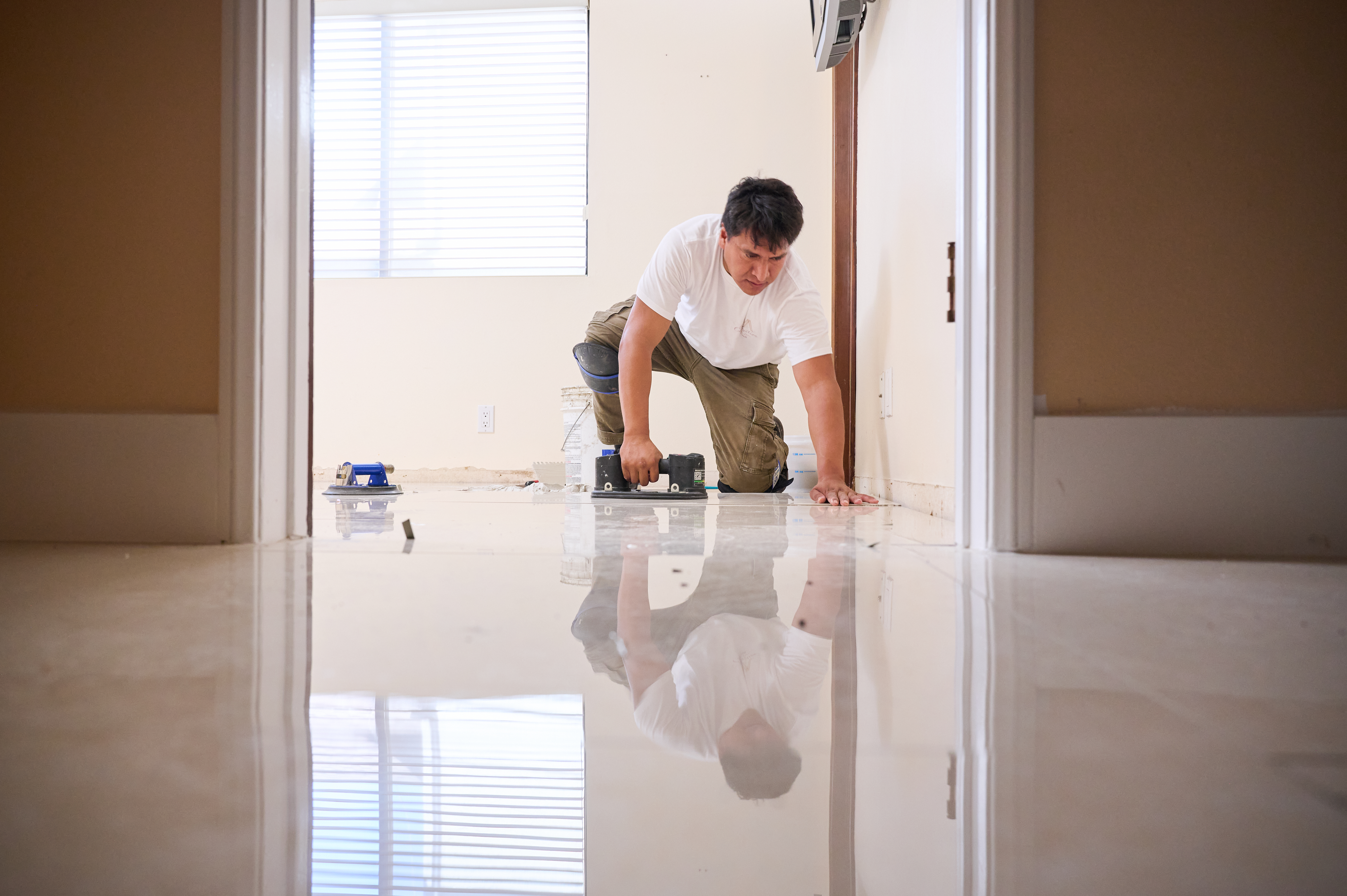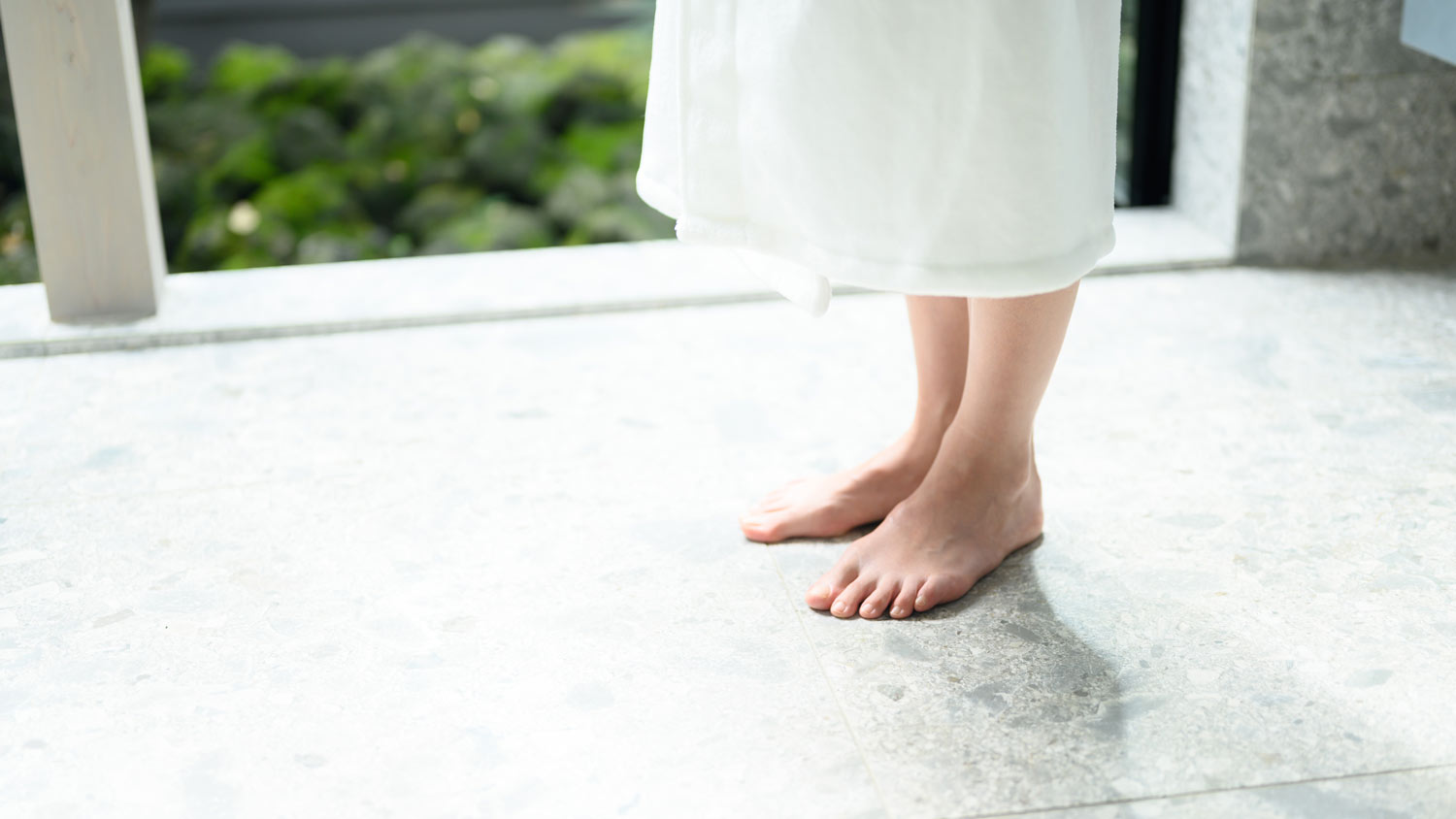
Laminate is a solid choice for many homes because it's durable and budget-friendly. Check out this guide to learn about laminate flooring installation costs.
A 4-by-8-foot sheet of OSB costs $40 to $60, with a national average of $50. A pro can factor in board thickness, type, and project size for an accurate estimate.


The type of Oriented Strand Board and the thickness impact costs, with subflooring requiring thicker, pricier panels than wall sheathing.
Tools and labor add up quickly, and DIYing the project saves on labor but requires investing in saws and nail guns.
Proper installation, including preventing damage with correct spacing and moisture protection, is essential to avoid costly repairs.
Oriented Strand Board (OSB) costs an average of $50 for each 4-by-8-foot sheet, but prices range from as low as $30 to as high as $75. This translates to roughly $1 to $2.40 per square foot, depending on the thickness and application. OSB pricing varies based on the thickness of the board and current market conditions affecting availability and cost. You’ll need to keep multiple cost factors in mind as you build a budget.
OSB pricing depends on two main factors: the application (sheathing versus subflooring) and board thickness. Subflooring requires thicker panels for structural support, making it more expensive.
| OSB Sheathing | OSB Subfloor |
|---|---|
| $1.00–$1.82 per sq. ft. | $1.56–$2.41 per sq. ft. |
Wall sheathing should be at least 7/16-inch thick, but in some cases, 1/4-inch may be enough. OSB wall sheathing comes in standard 4-by-8-foot sheets, which cost $32 to $58 per sheet.
“If you are using OSB, or any plywood for that matter, for sheathing, you need to use a sheathing tape,” says Bob Tschudi, an Angi Expert Review Board member and general contractor in Raleigh, NC. “This tape straddles the seams and keeps water away from the vulnerable edges of the wood which will quickly swell and deteriorate once it comes in contact with moisture. Sheathing tape is not expensive and is well worth the investment.”
Subflooring should be at least 3/4-inch thick to offer insulation and durability. Thicker panels carry a higher price than thinner OSB panels. OSB subflooring panels come in 4-by-8-foot sheets that cost between $50 and $77 per sheet.

OSB ranges from $32 to $77 per 4-by-8-foot sheet. The cost per panel depends mostly on thickness, ranging from 1/4-inch to 23/32-inch. Here are standard thicknesses and their costs per sheet:
1/4-inch: $32–$37
7/16-inch: $34–$51
1/2 inch: $34–$51
23/32-inch: $50–$56
3/4-inch: $58–$77
First, measure your space to determine how many boards you’ll need. Most boards come in 4-by-8-foot sheets, though you can get handy panels that are smaller but cost a bit more per square foot.
No matter if you’re installing wall sheathing or subflooring, you’ll need some standard tools to install your OSB board:
| Tool | Average Cost |
|---|---|
| Tape measure | $10–$40 |
| Level | $10–$30 |
| Chalk line | $8–$30 |
| Circular saw (with a carbide blade) | $140–$370 |
| Hammer | $12–$31 |
| Nail gun | $130–$400 |
| 8D (common) nails | $6–$20 |
The labor cost to install OSB board ranges from $25 to $30 per hour, depending on the project's complexity and the size of the space. If you want to waterproof your OSB or prime and paint it, you’ll need to pay more for the extra labor and supplies. Some pros prefer to charge by the project, which could range from 20% to 50% of the total, while others have a hidden cost of around $1 to $3 per square foot.
When you hire a professional flooring company near you, you’ll spend about $25 to $35 per hour on labor. This typically ranges from $1,500 to $4,500—although you may spend less on labor to replace the subfloor in a single room. While it may be tempting to save, a pro can help you avoid costly repairs and potential injury from improper DIY work.
| Type of Expense | DIY Costs | Pro Costs |
|---|---|---|
| Materials | $32–$77 per sheet | $32–$77 per sheet |
| Tools | $325–$925 | $0 |
| Labor | $0 | $1,500–$4,500 |
| Total Cost* | $1,800–$4,500 | $3,000–$8,100 |
*For sheathing a standard 2,400-square-foot home with a 1,500-square-foot roof
While a savvy DIYer may be able to build a small utility shed in their backyard, it’s always best to hire a pro to install OSB flooring for the following reasons:
Subfloor installation is part of a larger flooring renovation, and you won’t save much money by doing the OSB installation yourself.
Improper installation can lead to potentially hazardous issues like leaks, mold growth, floor failure, and structural shifting.
DIY installation comes with several injury risks, including splintering, power tool accidents, dust inhalation, and slips and falls.
Professionals know how to avoid hidden hazards, such as plumbing issues, electrical wires, and moisture problems.
Simple mistakes, like misaligned seams or overdriven nails, can damage your flooring and lead to costly repairs.
Flooring contractors understand the nuances of OSB installation, including the type of OSB to use, the fasteners that provide longevity, and the proper spacing of boards and nails to prevent issues like buckling.
A pro can help you improve your energy efficiency by implementing proper air sealing, tight joints, and correct insulation.
Reputable pros carry insurance and may offer warranties.
A DIY job may void your homeowners insurance or manufacturer warranties.
If you want to DIY your own OSB installation, opt for smaller jobs and leave the larger renovations to a pro. Here’s how you can participate in the process without taking on too much:
Do some of the work yourself (like ripping out the old floor) and hire a pro for the rest of the project.
Let the boards acclimate in the area for 24 to 48 hours before installation. Avoid exposure to moisture and high humidity, as this can cause the boards to warp.
If you're installing OSB in an area with high moisture, ensure your pro uses a moisture-resistant variety and seals it properly.
Be sure to avoid potential hazards, such as damaging plumbing or electrical wiring, during the demolition process.
Do not attempt to climb on your roof to install OSB—hire a pro for hazardous jobs instead.

This versatile building material is readily available at various retail locations, whether you're a professional contractor or a DIY enthusiast. Keep in mind that prices will vary depending on where you live and where you shop.
Additionally, having OSB shipped to your home instead of you picking it up will significantly boost your out-of-pocket expense. For instance, having a 7/16-inch, 4-foot by 8-foot sheet of OSB shipped to your home may cost as much as $80 for a sheet that costs less than $16. To keep your budget in check, do your research before moving forward.
Lumberyards and building supply stores are primary sources for OSB. These establishments stock various sizes and grades of OSB for different construction projects. They’ll also have knowledgeable staff who can assist you in choosing the right type and quantity of OSB for your task.
Popular chain stores, including Home Depot, Lowe's, and Menards, sell the material, but some locations may not stock lumber, so it is best to call first before heading out. You can also order OSB online from these stores for delivery or pick up.
Speaking of online, OSB is available through numerous online retailers, including large e-commerce platforms like Amazon and specialized construction material suppliers. Online purchasing allows you to compare prices and read product specifications and reviews from other customers before deciding.
The best part about shopping locally is supporting your community, especially if you want to avoid traveling to chain stores. Many mom-and-pops and Ace Hardware stores carry or will order OSB sheets for your project. Remember, the advantage of shopping at local hardware stores is the personalized service and attention you will get.
According to the National Association of Home Builders (NAHB), composite lumber prices decreased by 0.9% at the beginning of December 2024. Even though OSB prices stayed flat in the organization’s week-to-week comparison, prices are still 15.8% higher than this time last year.
One of the biggest reasons behind the overall spike in lumber prices is sawmill closures in Canadian and southern U.S. sawmills. The increased tariffs imposed on Canadian lumber will continue to result in mill closures or cuts, which could result in a decrease of around 670 million board feet of lumber annually.
You can protect your budget in a few ways when installing OSB panels:
Measure your project space accurately and double-check before cutting boards to avoid material waste.
Choose standard sizes for your space to reduce labor costs and the amount of materials needed for customization.
Shop around at home improvement stores for the best price, especially if you’re tackling a more extensive project that will require a lot of OSB panels.
You can install OSB board yourself instead of hiring a contractor or do some of the work yourself, such as ripping up old flooring.
There are numerous OSB applications, so be prepared to discuss your needs with your flooring contractor.
A pro will get the exact measurements of the installation area, but to get an accurate quote, you’ll need a rough idea of the size.
Let your pro recommend the type of flooring, as you can save by installing both a subfloor and floor covering at the same time.
Consider ahead of time if you’d like to opt for upgrades like underfloor heating.
Home is the most important place on earth, which is why Angi has helped more than 150 million homeowners transform their houses into homes they adore. To help homeowners with their next project, Angi provides readers with the most accurate cost data and upholds strict editorial standards. We extensively research project costs to develop the pricing data you see, so you can make the best decisions for you and your home. We rely on reputable sources, including the U.S. Bureau of Labor Statistics, academic journals, market studies, and interviews with industry experts—all to ensure our prices reflect real-world projects.
Want to help us improve our cost data? Send us a recent project quote to [email protected]. Quotes and personal information will not be shared publicly.
From average costs to expert advice, get all the answers you need to get your job done.

Laminate is a solid choice for many homes because it's durable and budget-friendly. Check out this guide to learn about laminate flooring installation costs.

Discover natural stone flooring costs for your home. Learn about material, labor, and installation factors to budget confidently for your flooring project.

Updated flooring can make any room in your home feel brand new. Explore flooring installation costs in St. Louis, MO, from materials to labor costs.

Uneven floor joists don’t just lead to annoyingly sagging floors; they could be a sign of bigger issues. Here’s who to hire to fix flooring joists.

Discover the cost to install a heated bathroom floor. Learn about installation prices, cost factors, and tips to save on your heated bathroom floor project.

If you have ever wanted to learn how to install transition strips on concrete, this resource will equip you with everything you need to know.